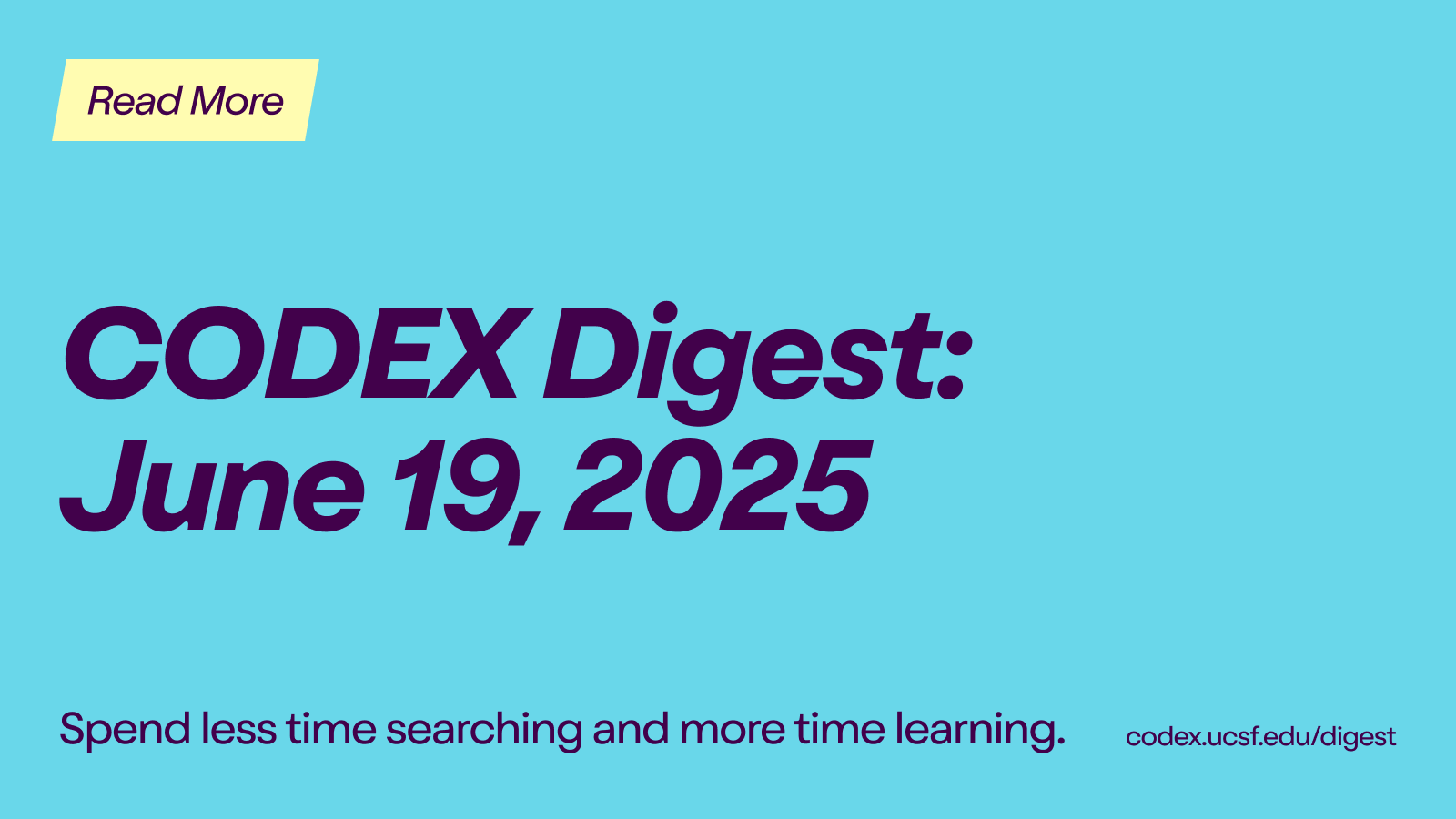CODEX Digest - 6.19.25
Want this delivered straight to your inbox every Thursday? Subscribe now.
Here are this week's must-reads:
Cau R, Pisu F, Suri JS, Saba L. Eur J Radiol. 2025;183:111867.
Equitable, accurate information is key to diagnosis of cardiovascular disease across diverse patient populations. This systematic review analyzes evidence on effective use of AI in cardiac care environments and its potential for ethnic and racial bias. The results illustrate a notable concern that racial/ethnic biases exist in the majority of AI outputs and underscore the need for evaluations of performance of AI in cardiovascular care.
Di Palma G, Scendoni R, Tambone V, et al. J Healthc Risk Manag. 2025;44(4):25–33.
Enterprise risk management is a proactive system-focused approach to identifying and addressing weaknesses and preventing failure. This perspectives piece discusses clinical, technical, and socio-ethical challenges to AI implementation. It highlights impacts on diagnostic processes and patient outcomes. The authors recommend methods to identify failure modes, map risks, and inform collaboration to aid in the safety implementation of AI in hospital settings.
Dukhanin V, Krishnan L, Jajodia A, et al. J Patient Saf Risk Manag. Epub 2025 May 8.
Patient participation in measurement is a key aspect of improving diagnostic excellence. Numerous factors impact diagnostic effectiveness in vulnerable populations. This study highlights the role patient-reported experiences and outcomes present to identify improvement opportunities in the diagnostic process. The authors present a framework that centers on process points to inform future measurement tool development.
Towards accurate differential diagnosis with large language models.
McDuff D, Schaekermann M, Tu T, et al. Nature. Epub 2025 Apr 9.
The authors discuss the Articulate Medical Intelligence Explorer (AMIE), a large language model designed to emulate diagnostic reasoning with the goal of standalone differential diagnosis creation or as a tool for clinicians to use to support their thinking. A set of 302 challenging cases served as a test for the system. Clinicians with the assistance of AMIE scored the highest accuracy rate of the cohort. The results further support the value of intelligent systems as tools for clinicians to achieve diagnostic excellence.
Miller SD, Pender TM, Lallo J, et al. Curr Probl Diagn Radiol. Epub 2025 Apr 18.
Radiologists hold an important yet risk-prone role in the diagnostic process. This study provides a 10-year review of radiology litigation cases. The authors found 82.9% of cases were diagnostic errors. In particular, breast imaging was most associated with legal action. The findings can inform improvement actions at the organization and individual practitioner level.
**This topic was featured in a CODEX webinar.
Experiences of care and gaslighting in patients with vulvovaginal disorders.
Moss CF, Chinna-Meyyappan A, Skovronsky G, et al. JAMA Netw Open. 2025;8(5):e259486.
Medical gaslighting is the active dismissal of patient concerns, either intentionally or unintentionally. This lack of respect for patient symptoms and concerns is a recognized problem in gynecological care. This cross-sectional study shows 186 patients experienced clinician behaviors dismissing vulvovaginal symptoms. The patients reported belittling communications and uninformed physicians that caused them to consider ceasing care to delay a potential diagnosis or change providers at their own cost.
Revolutionizing Healthcare: Impact of Artificial Intelligence on Diagnosis, Treatment, and Patient Care. (purchase required)
Singh TP, Kumar CJ, Abraham A, et al, eds. Springer Nature Switzerland; 2025. ISBN: 3031808134
Artificial intelligence (AI) holds promise to improve decision making and predictive activity across healthcare. This contributed volume provides a survey of a range of AI applications such as machine and deep learning and their use in areas that include cardiovascular disease, breast cancer, and mental health. The book editors draw from experience in a variety of fields to examine the diagnostic and treatment impacts of AI.
A synthesized differential diagnosis is associated with fewer diagnostic errors compared to an inventorial list. (subscription required)
Sheline EK, Leonard J, Helmuth R, et al. Diagnosis (Berl). Epub 2025 Apr 4.
The art of the clinical differential diagnosis (DDx) is one of the most important processes clinicians implement for diagnostic excellence. This cohort study from the pediatric emergency room examined the risk of diagnostic error associated with two DDX approaches – the traditional “inventory” approach of a list of DDx, versus one with “synthesis” linking each DDx to clinical data. Synthesized DDx was associated with a lower rate of diagnostic error, even adjusted for confounders.
Improving timely diagnosis of arterial ischemic stroke at a pediatric emergency department.
Trigylidas TE, McCollum NL, Brown KM, et al. Pediatrics. Epub 2025 May 2.
Timeliness is a core element of excellence. This quality improvement study describes an initiative focused on improving diagnosis of pediatric stroke in the emergency department. The authors used Plan-Do-Study-Act cycles to inform development of an alert system and order sets to enhance diagnosis. The time taken from arrival to imaging and stroke confirmation was reduced to improve the treatment of children with this serious condition.
Overcoming barriers in the use of artificial intelligence in point of care ultrasound.
Vega R, Dehghan M, Nagdev A, Buchanan B, Kapur J, Jaremko JL, et al. NPJ Digital Med. 2025;8(1):213.
Image analysis at the bedside can assist in quickly resolving unknown physical condition questions rapidly. This perspectives piece explores the potential in combining AI technologies with bedside ultrasound tools, existing concerns regarding the use of AI, and highlights its value as a tool, not a replacement for clinician expertise and judgement.
About the CODEX Digest
Stay current with the CODEX Digest, which cuts through the noise to bring you a list of recent must-read publications handpicked by the Learning Hub team. Each edition features timely, relevant, and impactful journal articles, books, reports, studies, reviews, and more selected from the broader CODEX Collection—so you can spend less time searching and more time learning.
Get the latest in diagnostic excellence, curated and delivered straight to your inbox every week:
See past digests here.

